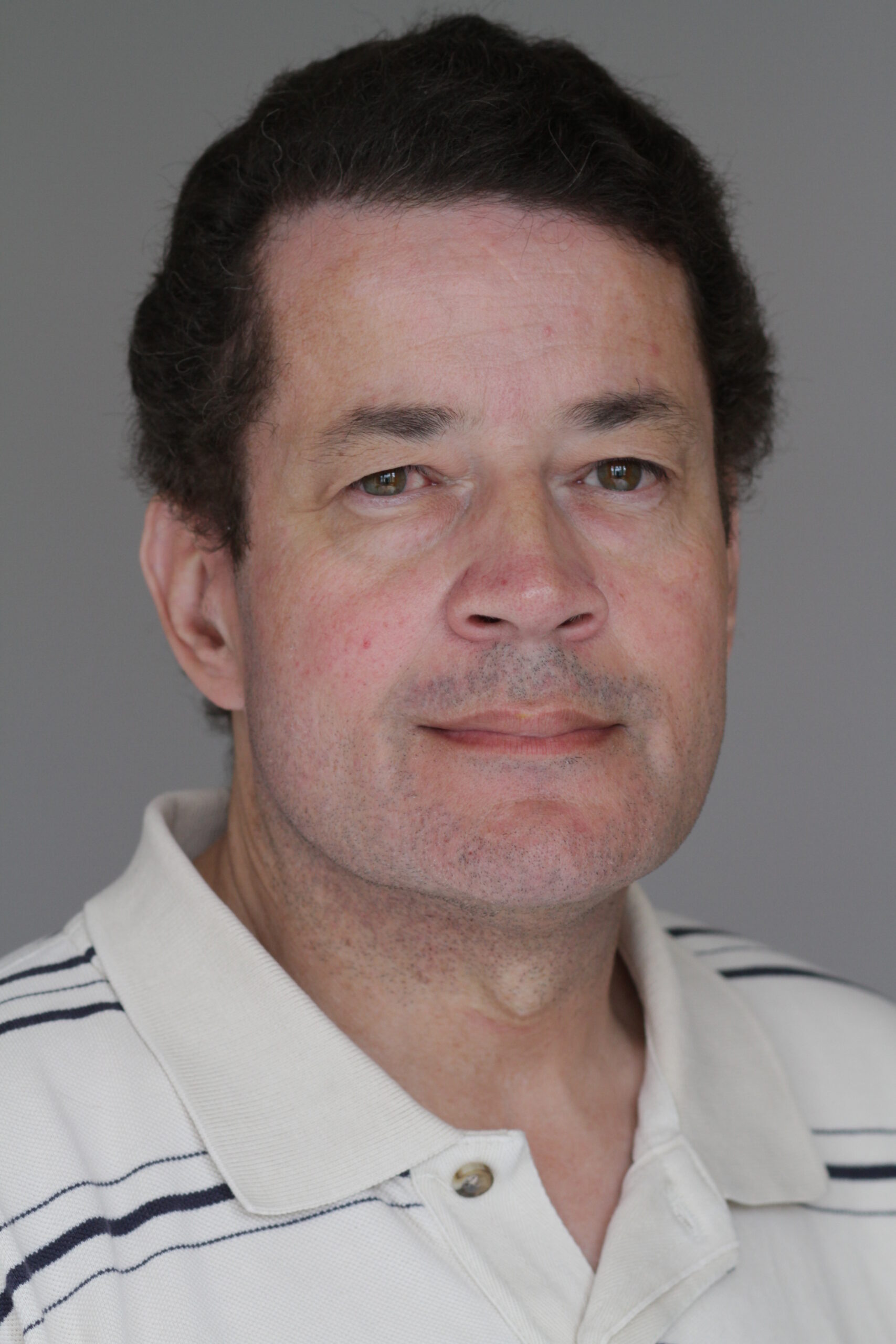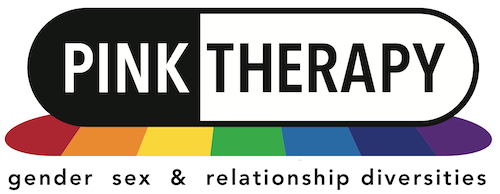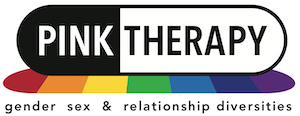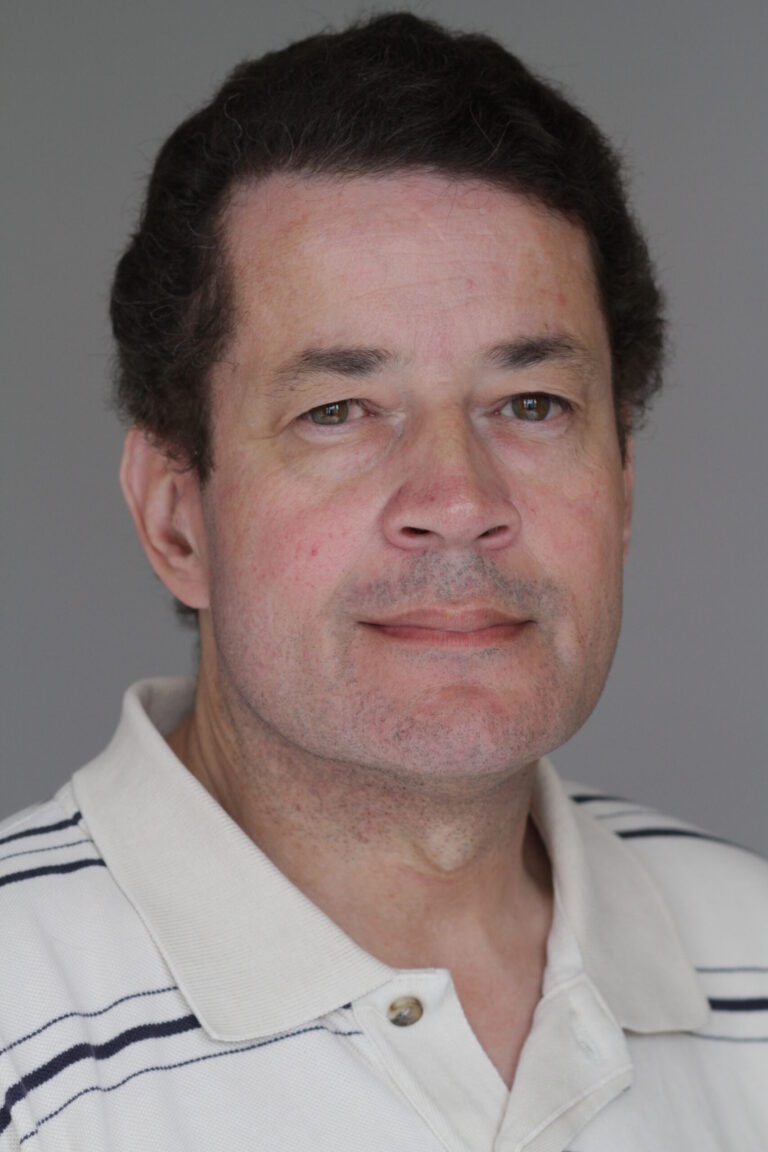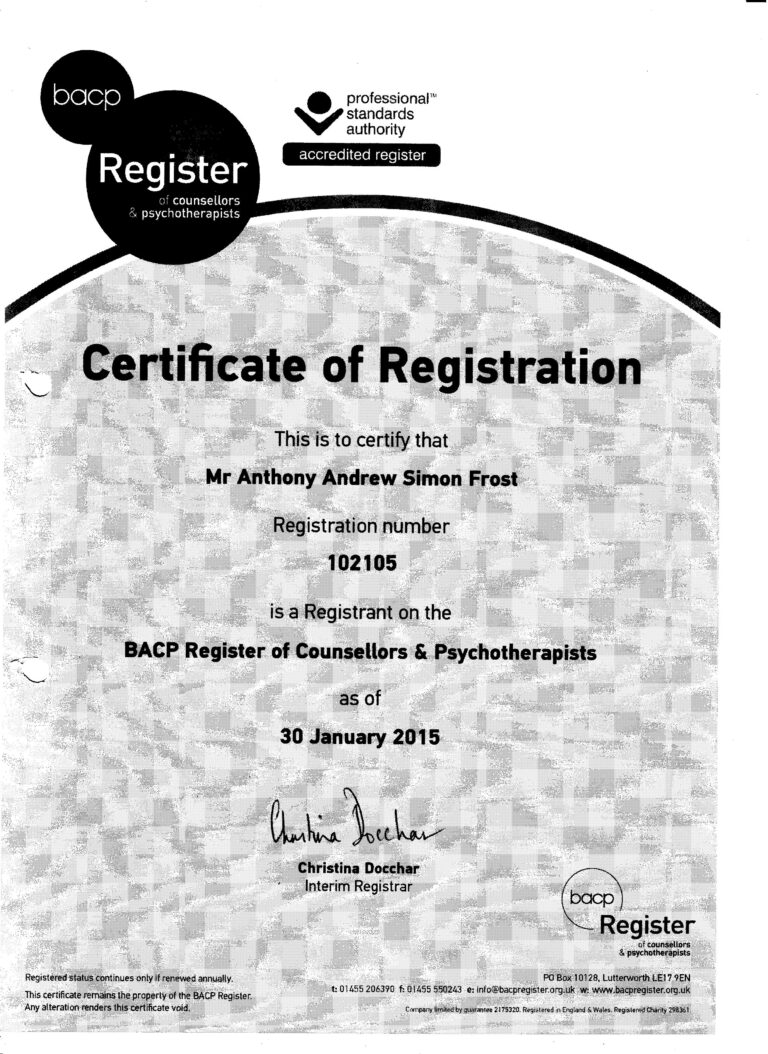Anthony Frost
About the Therapist
I provide an integrative approach to therapy, this includes psychological, physiological, sociological and relational frameworks, always adopting a GSRD/LGBTQI+ affirmative approach in my work. I incorporate three main counselling modalities into my work: Cognitive Behavioural Therapy, which looks at our response to events; Humanistic/Person Centred, which is concerned with the 'here and now' and Psychoanalytic/Psychodynamic, which considers how the past affects and influences the present. I work in collaboration with you, to make sense of the issue(s) which have brought you to me and, with that insight, we work together, towards enabling you to lead a more fulfilling life. I won't tell you what you should do although we can discuss your options to enable you to make an informed decision around the issues which have led you to seek counselling - however - in Psychosexual therapy for sexual dysfunctions, things differ a little because I give you behavioural exercises to undertake at home on your own or with your partner.
- Gay
My professional training includes:
- MSc Degree in Psychosexual Therapy
- Postgraduate Diploma in Relationship Counselling
- Postgraduate Diploma in EMDR (Eye Movement Desensitization and Reprocessing)
- BSc Degree in Reflective Therapeutic Counselling Practice
- CPCAB Diploma in Sex Addiction Counselling
- CPCAB Diploma in Cognitive Behavioural Therapy
- CPCAB Diploma in Integrative Therapeutic Counselling
- STOPSO (StopSexualOffending.org) CPD training in working with
Professional Memberships:
- ATSAC - Association for the Treatment of Sexual Addiction and Compulsivity (Membership Number: 0347)
- BACP - British Association for Counselling and Psychotherapy (Register Number: 102105)
- COSRT - College of Sexual and Relationship Therapists (Membership Number: 4012).
BACP Register entry: https://www.bacp.co.uk/search/Register?UserLocation=51.4573568%2C-0.2109949&q=anthony+frost&SortOrder=0
| Award | Awarding body | Year of award |
|---|---|---|
LGBTQI+ Counselling Today, there is a wider acceptance of difference and diversity, but people in the LGBTQI+ community are more likely to have to work harder to maintain their mental health. There are still many challenges to face for gay men, lesbians and people from the LGBTQI+ community living in a heteronormative culture. Many challenges and issues can arise around sexuality and gender identity, including discrimination, rejection and victimisation, all of which can have a detrimental impact on wellbeing, including emotional and mental health. Working through such challenges can also have an impact upon other areas of our lives including self-esteem, relationships and life choices, work environments and social life. If you feel that you are having issues related to your sexuality that you cannot resolve alone it is important that you work with a trained professional. I will work with you to support you on your journey to reach your unique goals and to enable you to work through your emotions and thought processes, to ultimately n the person you want to be - the real you. Sexuality and Gender Sexuality relates to the who and what someone is attracted to whereas Gender Identity is a way to describe how someone feels about their gender. It can be confusing and difficult in a heteronormative culture when you come to the realisation that there might be something different about you and to take the steps necessary to understand and develop an acceptance of who you are. If difficult emotions are buried and not addressed, often further emotional difficulties and issues arise as a result. Couples Counselling & Psychotherapy for LGBTQI+ I work with lesbian, gay, bisexual and transgender couples and individuals. Whether it is to mend or deepen a relationship or to offer professional support during a separation/divorce process. Psychosexual Therapy for sexual difficulties and dysfunctions: Psychosexual Therapy or Sex Therapy helps to resolve problems and issues relating to sex. It might be a general loss of interest in sex or an obvious symptom such as premature ejaculation, erectile disfunction, vaginismus or difficulty climaxing. Working with a psychosexual therapist involves exploring the various physical, psychological, emotional and environmental causes that are contributing to your sexual issues. Sexual problems are common and the best way to deal with them is through talking, coupled with behavioural exercises where appropriate (which you undertake inthe privacy of your home and not during our sessions). Psychosexual Counselling and Psychotherapy can help with:
- Male Erectile Disorder: Persistent or recurrent inability to retain or maintain until completion an adequate erection.
- Premature Ejaculation: Persistent or recurrent ejaculation with minimal sexual stimulation before, on, or shortly after penetration and before a person wishes it. The Clinician will take into account the contextual situation ie age, new relationship, and recent frequency of sexual activity.
- Male Orgasmic Disorder: Also more commonly known as 'Delayed Ejaculation' and is a persistent or recurrent delay in, or absence of orgasm following normal sexual stimulation. The Clinician will take into account age, adequate focus and intensity and duration of sexual activity.
- Vaginismus: Recurrent or persistent involuntary spasm of the musculature of the outer third of the vagina that interferes with sexual intercourse.
- Dyspareunia: Recurrent or persistent genital pain associated with sexual intercourse in either male or female.
- Female Orgasmic Disorder: Persistent or recurrent delay in, or absence of orgasm following a normal excitement phase. Women exhibit a wide variation in the type or intensity of stimulation that triggers orgasm.
- Female Sexual Arousal Disorder: Persistent or recurrent inability to attain, or maintain until completion of sexual activity an adequate lubrication-swelling response to sexual excitement.
- Sexual Aversion Disorder: Persistent or recurrent extreme aversion to, and avoidance of all [or almost all] genital sexual contact with a sexual partner; both male or female or same sex.
Whether it’s via individual counselling relationship counselling, addressing sexual issues is an important part of well-being. In instances where the root problem is found to be psychological and/or emotional, I will work with you to help you understand and work through such issues. The aim being that if you work through the emotional issues the physical symptoms will also improve.
What to expect An assessment appointment is booked initially as an opportunity for you to understand how I work and to ask any questions you have. At this appointment you can also discuss how best to work together going forward and for us both to understand what your needs and goals are. We will discuss the therapeutic boundaries and contract which lays out what you can expect from me as your therapist and what I ask of you as a client. I appreciate the importance of you finding the right therapist to work with, and, I am happy to have a brief, informal conversation with you by telephone or online via Zoom, to answer any questions you may have prior to arranging an initial meeting and there's no obligation to continue. Please call me on: 07504 841 989 or email me via: afcounselling@btinternet.com. If I am unable to take your call, please leave a message stating convenient times for me to contact you. To maintain your confidentiality, I do not return missed calls where no message is left.
- Attachment theory (Psychodynamic)
- Brief dynamic
- Cognitive Behavioural Therapy (CBT)
- Couple therapy
- EMDR
- Emotion-Focused Therapy
- GSRD therapy
- Humanistic
- Integrative
- Person-Centred
- Psychodynamic
- Psychosexual Somatics® Therapist
- Relationship therapy
- Ace | Asexual
- BDSM | Kink
- Bi- | Pansexual
- Consensual non-monogamy
- Cross-dresser
- Gay
- Intersex
- Lesbian
- Non-binary | Genderqueer
- Queer
- Questioning
- Survivors of attempted conversion therapy
- Trans
- One to one
- Two people
- Three or more people
- No adaptation
- Adults
- Seniors (60+)
- Young adults (16-24)
- Online
- In Person
Fees
Sorry, no records were found. Please adjust your search criteria and try again.
Sorry, unable to load the Maps API.
